 28
28
Considered
 92
92
of Research
 54
54
Examined
 12
12
Interviewed
As a certified fitness coach with training in sports nutrition, I have personal and professional experience with several top gluten-free protein powders.
My unique background helps me to understand the benefits of these powders as well as the precautions needed when taking them.
To help our readers choose the top gluten-free protein powders, I got 14 clients to help out with testing some of the most popular products available. Over a 6-week period, we gathered data and analyzed it with 12 expert colleagues.
The Best Gluten-Free Protein Powders
- Best Overall Gluten-Free Protein Powder: Transparent Labs
- Cheapest Gluten-Free Protein Powder: CLICK
- Best Organic Gluten-Free Protein Powder: Orgain
- Best Vegan Gluten-Free Protein Powder: Vega Sport
- Best Low-Carb Gluten-Free Protein Powder: Isopure Zero Carb
- Best Vitamin-Rich Gluten-Free Protein Powder: Muscle Milk
- Best Plant-Based Gluten-Free Protein Powder: PlantFusion Complete Protein
Our Top 7 Gluten-Free Protein Powders (February 2026)
1 - Transparent Labs Whey Protein Isolate (Best Overall)
- Price per serving : $1.48
- Key ingredients : Grass-fed whey protein isolate
- All flavors : French Vanilla, Milk Chocolate
- Third-party tested : Yes
Pros and Cons
Pros
- 28g of whey protein in every serving
- 100% gluten-free and non-GMO for added peace of mind
- No artificial additives for flavor or color that could cause side effects
- Only 1g of carbs to not mess with diet efforts
- Zero fat to account for on your diet plan
Cons
- Not available as an unflavored protein powder
Who is it for?
Who is it for?
- Health-conscious individuals looking for grass-fed sources
- Athletes needing high protein with minimal additives
Who is it not for?
- Those with lactose intolerance or dairy allergies
Final Verdict
This product offers high-quality protein from grass-fed whey, making it ideal for those serious about fitness and health. It's not suitable for vegans or those with dairy sensitivities.
When it comes to whey protein isolate, quality is as important as quantity. That’s exactly why Transparent Labs has created this a gluten-free product exclusively sourced from grass-fed cows.
Aside from offering gluten-free whey protein powders, the company also prides itself in the GMO-free certificate and no artificial additives.
From personal experience, I can say that it's easily digested, extremely tasty, and works great for muscle recovery.
As per the nutrition label, you will get 28g of protein in each serving, which is on the high side for average protein powders.
Overall, it’s a good product that many have positively reviewed online. The product is also the Editor's Choice for the Best lactose-free powders and Best protein powders for runners.
Get 10% off using coupon code: TOTALSHAPE
2 - Orgain Organic (Best Organic)
- Price per serving : $1.50
- Key ingredients : Organic pea protein, brown rice protein, chia seeds
- All flavors : Vanilla Bean, Creamy Chocolate Fudge
- Third-party tested : Yes
Pros and Cons
Pros
- 100% brown rice protein free of genetically modified organisms
- Produced in a certified USDA facility
- Mixes easily with virtually anything
- Affordably priced
Cons
- Quickly becomes chalky if you mix it too much
Who is it for?
Who is it for?
- Vegans and those preferring plant-based proteins
- Organic ingredient enthusiasts
Who is it not for?
- People who prefer whey or animal-based proteins
Final Verdict
Orgain provides a clean, plant-based protein option perfect for those on a vegan diet or with sensitivities to conventional protein sources. It may not appeal to traditional whey users.
Orgain Organic is a certified organic supplement and is ideal for vegans or vegetarians. On top of that, it just happens to be one of the highest quality gluten-free protein powders you can buy.
Our testing team included two vegan athletes, and they reported great results for ease of digestion and impact on muscle mass.
The complete protein here is derived from hemp and brown rice protein, which is known to be rich in iron, calcium and magnesium and low in carbs and calories.
In addition to being gluten-free, there's no added sugars, no artificial preservatives, no soy and it comes in a variety of natural flavors. It's probably going to cost you more, but it's always worth the stretch.
3 - CLICK Coffee & Protein (Cheapest Option)
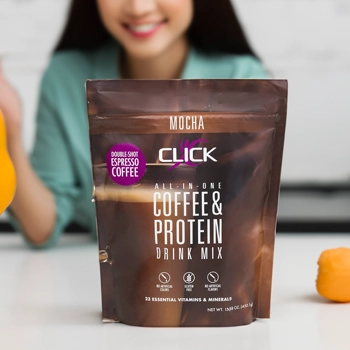
- Price per serving : $1.67
- Key ingredients : Whey protein, real coffee
- All flavors : Vanilla Latte, Mocha
- Third-party tested : No
Pros and Cons
Pros
- Works as a complete meal replacement
- Encourages healthy eating habits
- Appetite-suppressant and energy booster
Cons
- Obviously not suitable for those sensitive to caffeine
Who is it for?
Who is it for?
- Coffee lovers seeking a protein boost
- Individuals looking for a convenient breakfast replacement
Who is it not for?
- Non-coffee drinkers
Final Verdict
CLICK is ideal for coffee enthusiasts who want to combine their caffeine routine with protein intake. However, it's not recommended for those who avoid caffeine.
CLICK Coffee & Protein powder can curb appetites on a gluten-free diet, give you an energy boost, and even function as a complete meal replacement packed full of nutrients, all while being completely gluten-free.
I regularly take this supplement as a pre-workout drink or before I go for a run to get a brain boost.
It works just as well for those who are looking to bulk up as it does for those after a lean physique.
The taste is great, made from real espresso, so any java fiends out there will be very happy.
There are a wide variety of flavors to choose from, and you can make significant savings if you buy in bulk to try them all out.
4 - Vega Sport (Best Vegan)
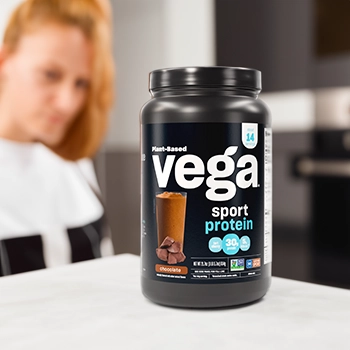
- Price per serving : $0.78
- Key ingredients : Whey protein isolate, whey protein concentrate, whey peptides
- All flavors : Double Rich Chocolate, Vanilla Ice Cream
- Third-party tested : Yes
Pros and Cons
Pros
- Non-GMO protein powders
- Low in both saturated fat and carbs
- Rich in branched chain amino acids
- Extremely easy to digest
Cons
- Recently changed its flavor
Who is it for?
Who is it for?
- Gym enthusiasts needing fast-absorbing protein
- Those who prefer a variety of flavors
Who is it not for?
- People avoiding artificial flavors and sweeteners
Final Verdict
Optimum Nutrition is a go-to for athletes wanting a reliable, tasty protein supplement. Its extensive flavor range suits various tastes, but it's less suitable for the clean-label crowd.
Vega Sport protein powder is carefully formulated with pre and probiotics to create a healthy digestive environment.
A few of our testers who tried this product reported that they didn't get the same bloating they usually experience with protein supplements.
This protein powder for a gluten-free diet is also derived from not one but five different plant-based sources and contains plenty of BCAAs your body needs in order to recover from a vigorous workout.
This protein powder is low in both carbs and saturated fat, is devoid of any hint of genetically modified organisms and is the perfect supplement for those on the ketogenic diet.
5 - Isopure Zero Carb (Best Low-Carb)
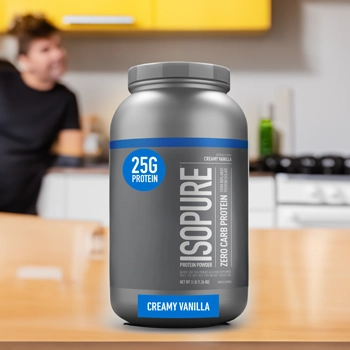
- Price per serving : $1.69
- Key ingredients : 100% whey protein isolate
- All flavors : Dutch Chocolate, Toasted Coconut
- Third-party tested : Yes
Pros and Cons
Pros
- Has zero carbs for those on the keto diet
- Contains essential vitamins and minerals
- Lactose-free protein powders
- Is an effective whey protein isolate
Cons
- Contains a few artificial ingredients
Who is it for?
Who is it for?
- Individuals on a low-carb or ketogenic diet
- Those seeking lactose-free whey protein
Who is it not for?
- Vegans
Final Verdict
Isopure supports muscle building without the carbs, perfect for keto dieters. It's not appropriate for those following a vegan lifestyle.
Isopure Zero Carb is a great way to power up your keto diet and to derive enhanced results from your time in the gym.
Our test results show that it helps in delivering nutrients to overworked muscles post-workout like other protein powders, as well as provide the strength and endurance you'll need prior to your workout.
Isopure Wis available in a variety of flavors, so there's bound to be one that's suitable to your taste preference.
Have your meal replacement shakes first thing in the morning to jump-start your day or after your workout to activate the process of recovery.
Also read: Best Low-Carb Protein Powders
6 - Muscle Milk (Best Vitamin-Rich)
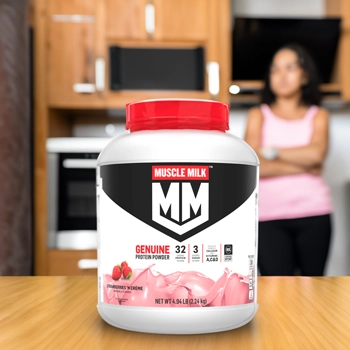
- Price per serving : $0.75
- Key ingredients : Calcium sodium caseinate, milk protein isolate, whey protein isolate
- All flavors : Chocolate, Vanilla Creme
- Third-party tested : Yes
Pros and Cons
Pros
- Provides an array of beneficial vitamins
- Great protein powder for pre or post-workout supplementation
- Rich in iron, calcium, and magnesium
- Contains 32 grams of protein per serving
Cons
- Contains a couple of seemingly unnecessary additives
Who is it for?
Who is it for?
- Anyone needing a high-protein, nutrient-rich option
- Bodybuilders and athletes
Who is it not for?
- Those with dairy sensitivities
Final Verdict
Muscle Milk is excellent for building muscle and recovery due to its rich protein and vitamin content. Not ideal for anyone with lactose intolerance.
Each serving of Muscle Milk protein powder contains 32 grams of protein and is low in calories and rich in calcium, iron, and magnesium.
It is also loaded with vitamins A, C and D while being devoid of genetically modified organisms.
In my experience, taking this on a daily basis will also save you on other supplement expenses you might have for those vitamins and minerals.
Mix Muscle Milk with water or milk or add it to your pancake or muffin batter.
If you’ve been experiencing a lack of energy in the gym or protracted recovery times after strenuous workouts, this will fill help the nutritional gap and get you back to help you achieve a leaner, stronger you.
7 - PlantFusion Complete Protein (Best Plant-Based)
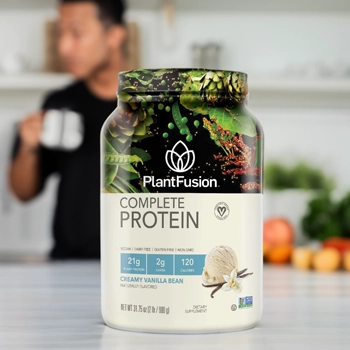
- Price per serving : $1.87
- Key ingredients : Whey protein isolate
- All flavors : Vanilla, Tropical Dreamsicle
- Third-party tested : Yes
Pros and Cons
Pros
- High in naturally occurring branched chain amino acids
- Is a gluten-free and dairy-free protein powder with no artificial sweeteners
- Mixes easily for delicious gluten free shakes
- No genetically modified ingredients
Cons
- Contains 390 mg of sodium in the average serving
Who is it for?
Who is it for?
- Dieters and athletes preferring a protein with no fat or cholesterol
- Those who enjoy sweet, natural flavors
Who is it not for?
- Those looking for a non-whey protein option
Final Verdict
Jay Robb's Whey Protein is best for those who need a high-quality protein without fats or cholesterol and enjoy varied, natural flavors. It's less suitable for those avoiding animal-based proteins.
Plant-based protein is known to be more easily digestible which means you don't usually need as much to get the results you're after.
With PlantFusion gluten-free and non-GMO protein powders, you get all the nutrients you need and none of the soy, eggs, fish, nuts, or lactose you don't need.
Our vegan testers reported great results, and my dietitian confirmed that the mix one plant sources supplies all the essential amino acids you need.
Each serving provides 21 grams of efficacious, gluten-free plant-based protein, a scant 120 calories, and zero saturated fats.
PlantFusion protein powders are also hypoallergenic, and there isn't a genetically modified organism anywhere to be found in their state-of-the-art production facility.
How Did We Chose the Best Gluten-Free Protein Powders
In our mission to pinpoint the top gluten-free protein powders, we embarked on a thorough review and testing process, considering multiple crucial factors and comparing them with our hands-on experiences.
Protein Content
We focused on powders with pure protein doses between 20-30 grams, deeming 28 grams optimal for those on a gluten-free diet. This range is thought to offer the most benefits for muscle recovery and overall health.
Protein Source
The source of the protein is vital. We favored powders with complete proteins, checking if they stemmed from gluten-free grains or plant-based options like pea protein, hemp, chia, or brown rice, as well as whey.
Carbs and Fats
Our goal was to highlight powders with minimal carbs and fats, underscoring protein as the main component. Excessive carbs might offset a balanced gluten-free diet, so we favored powders with limited carbs and fats.
Flavor Profile
For gluten-free enthusiasts, the taste of protein powder matters, especially with many being natural. We prioritized powders that offered a pleasant taste without resorting to artificial sweeteners.
Mixability
A protein powder's mixability is crucial. We assessed how seamlessly each powder mixed with liquids, testing with water using both hand mixing and shaking methods.
Digestibility and Potential Reactions
Our team's feedback was instrumental in gauging the digestibility of each powder and noting any potential digestive concerns, like discomfort or bloating.
Third-Party Testing
Third-party evaluations of gluten-free protein powders vouch for their genuineness and purity. Such external checks reinforced our trust in the product's quality and ingredient purity.
Value for Money
The cost spectrum for gluten-free protein powders varies, swayed by ingredient quality, protein source, and brand reputation. We honed in on powders priced between $0.50 and $1.50 per 25 grams of pure protein, striking a balance between cost-effectiveness and excellence.
Is Whey Gluten-Free?
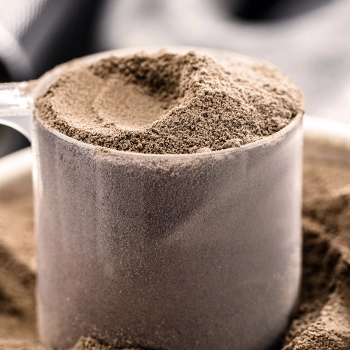
Yes, whey is gluten-free. Whether in concentrate, isolate, or hydrolysate form, whey protein itself does not contain this ingredient.
This means that if you suffer from any gluten sensitivities, consuming whey protein should be a safe thing to do. However, there are some types of supposedly gluten-free whey protein powders that include additives in their formulation, according to Beyond Celiac [1].
Glutamine, for instance, is a fairly common additive in protein powders that is derived from wheat, so look out for it on nutrient labels.
100% pure whey protein is naturally gluten-free; however, you may be concerned about some versions of whey protein that contain peptide bound glutamine derived from wheat protein. Those products should not be used if you have celiac disease or are gluten sensitive.
- A Stewart, MBA, RD.
Why is Gluten Added to Some Protein Powders?
Gluten is added to some whey protein powders to act as a flavoring, stabilizer, or preservative. It helps improve the texture and makes smoother gluten-free replacement shakes.
Related Posts:
In addition, peptide-bound glutamine is sometimes added to the supplement to cover for a loss of essential amino acids during processing.
Buyers' Guide for the Best Gluten-Free Protein Powder
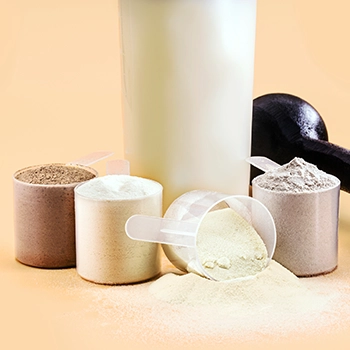
Here are the main considerations when buying gluten-free supplements.
Ingredient List
The fact that protein powders are not subject to FDA regulations complicates the matter, allowing companies to claim their protein is gluten-free while at the same time, they add glutamine to their protein powder to make it more agreeable.
Should you see any of the following on the ingredient list, you'll want to take a pass:
- Glutamine
- Wheat Starch
- Triticale
- Malts
Like Celiac disease, gluten sensitivity is a condition in which the immune system is activated by gluten, causing inflammation and intestinal permeability. But the immune system is not attacking the lining of the small intestine, like it is in Celiac disease.
- Steven Wright, SCD Lifestyle
Nutritional Comparison of Gluten and Non-Gluten Supplements
Gluten-free protein powders often derive from plant-based sources like peas or rice, while regular powders may use whey or casein from dairy. While both provide essential amino acids, gluten-free options might have fewer additives and cater to those with sensitivities.
However, it's crucial to examine individual product labels, as nutritional content can vary widely. Making an informed choice ensures you're meeting your health and dietary needs effectively.
Incorporating Gluten-Free Protein Powders in Daily Life
Enhance your meals by adding gluten-free protein powders to smoothies, oatmeal, or baked goods. For a quick snack, blend them into yogurt or sprinkle on fruit salads.
When making beverages, mix the powder with almond milk or water for a nutritious drink. And experiment with recipes to create tasty and protein-rich additions to your daily intake.
FAQs
What is the best gluten-free protein powder to build muscle?
Whey is the best gluten-free protein powder to build muscle. It provides the most extensive range of essential amino acids in the right concentration.
Your muscles will have all the essential ingredients to repair and build new muscle fibers, and it’s also one of the fastest types of proteins to digest.
Is gluten-free protein powder bad for your kidneys?
No, gluten-free protein powder isn't bad for your kidneys. In fact, the opposite is true in some cases. For example, if you have a gluten intolerance, regular exposure to it can cause inflammation in the intestines and have a knock-on effect on other organs, including the kidneys. It's best to consult a doctor before taking a gluten-free supplement or any other dietary supplement. That way, you'll know whether your body is fit to consume these supplements since you might be unaware of some pre-existing conditions like allergies or ingredient sensitivity.
Is too much gluten-free protein powder bad for you?
Yes, taking too much gluten-free protein powder is bad for you. Taking more than the recommended dosage will likely cause unpleasant side effects such as bloating and imbalances in your gut flora.
Are there any side effects with taking gluten-free powder?
Yes, there are side effects to taking gluten-free powder, but only if you take it in very large quantities.
Exceeding the daily recommended dose of any protein powder can cause stomach upset, nausea, headaches, and some cramping as well. These are fully reversible by taking a break from the supplement.
What are the challenges in producing gluten-free products?
Manufacturing gluten-free supplements demands meticulous sourcing of uncontaminated ingredients. Ensuring facilities are free from gluten residue is also an important aspect, requiring rigorous cleaning and separate processing areas.
Cross-contamination, even in minute amounts, can pose health risks to those with celiac disease or gluten sensitivities.
That's why it's important to focus your attention on trusted and third-party tested products like the ones we list above.
Our Verdict on the Best Gluten-Free Protein Powder
If you enjoy working out but are sensitive to gluten, or if you just wish to eliminate this possible health hazard from your diet, Transparent Labs Whey Protein Isolate should be considered your top gluten-free choice.
We can report from our personal experience and testing that Transparent Labs Whey Protein Isolate delivers when it comes to purity, quality, effectiveness, and affordability when compared to all other supplements available.
Our #1 Gluten Free Protein Powder
Transparent Labs Whey Protein Isolate (Best Overall)
Rated With Total Shape's Scoring System
- 28g of whey protein in every serving
- 100% gluten-free and non-GMO for added peace of mind
- No artificial additives for flavor or color that could cause side effects
- Only 1g of carbs to not mess with diet efforts
- Zero fat to account for on your diet plan
- Get the BEST PRICE until the end of February
- Not available as an unflavored protein powder
About The Author
You May Also Like
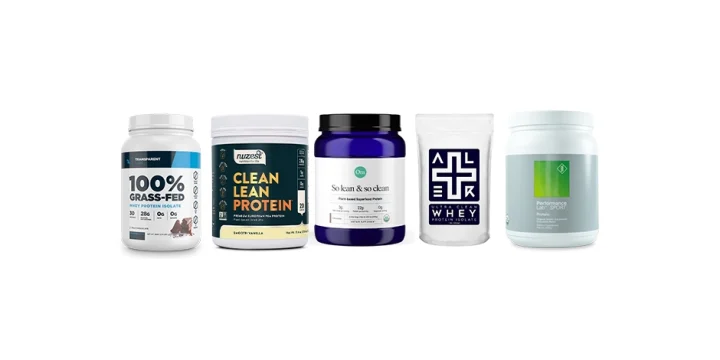
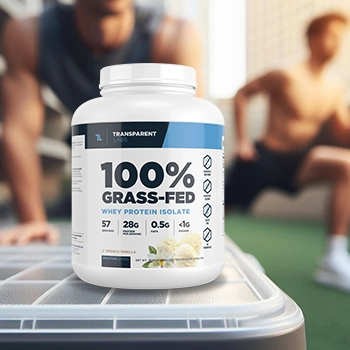
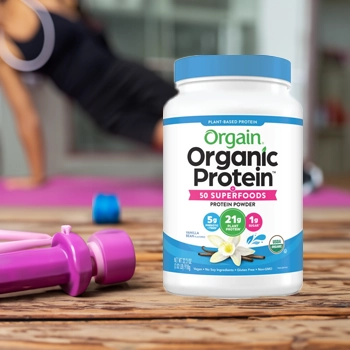
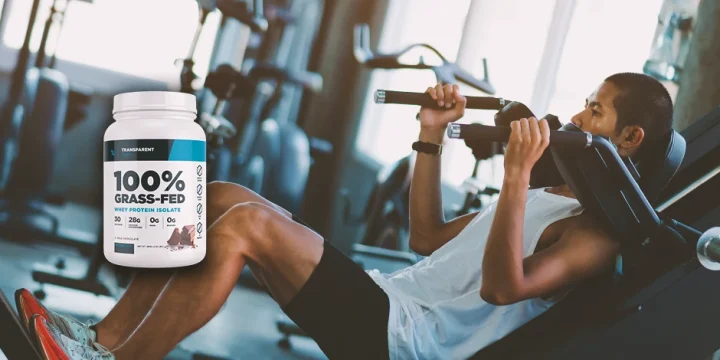


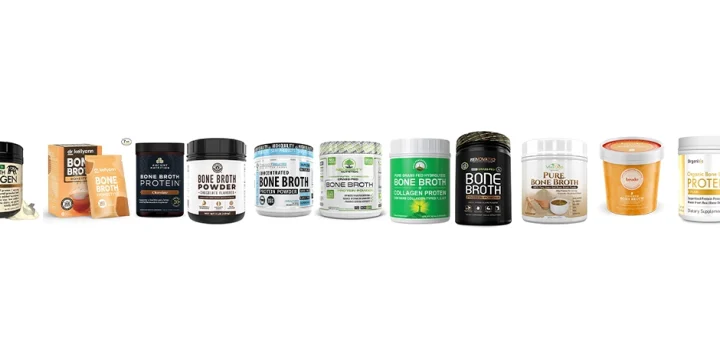
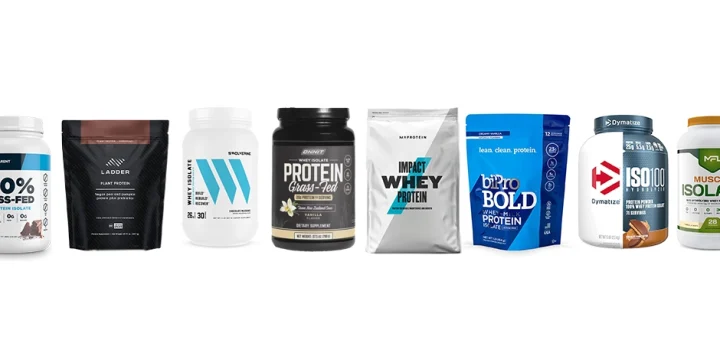
Nice read. Well, gluten doesn’t look bad at all. But are there any other side effects aside from those who have celiac disease? I’m just curious.